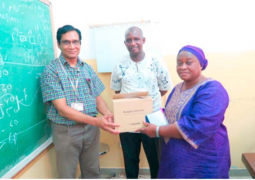Sustainable
public transport is at the heart of United Nation’s 2030 Agenda for Sustainable
Development and the 17 Sustainable Development Goals (SDGs). It is an
indisputable fact that an efficient public transport system connects people,
communities and societies, builds new markets and enhances the overall quality
of life.
To
achieve SDGs, governments all over the world are recognizing the significance
of reliable and affordable public transport. And like all other sectors,
technology has a crucial role to play here too!
Therefore,
the recent commissioning of twenty new Ashok Leyland buses by The Gambia
Transport Service Company (GTSC) is just towards fulfilling those lofty goals.
Officials
described the commissioning of the new fleet of buses as timely, considering
the fact that its fleets have been facing challenges in recent times. Since it started its operations in 2013, the
bus company today remains one of the largest carriers in the country’s
transportation sector with well-organised offices and support depots in every
region across the country.
As
urbanization and traffic congestion get closer to a tipping point, governments
have taken several measures to develop mass public transport systems. For
instance, countries especially in this part of Africa are on the verge of
expanding their transportation network with ease. To achieve sustainable
mobility, adoption of technology is a must. Corporate organizations and
national and local authorities need to be opened to new public transport
mobility systems and new technology innovations to provide better services,
plan road systems, regulate traffic, etc.
Certainly,
the massive investment by GTSC’s parent company – Social Security and Housing
Finance Corporation in the transport then and over the years has helped improve
the quality of lives for millions of people, who previously were excluded from
the economy.
As
rightly stated by the board chair of GTSC, who doubles as the managing director
of SSHFC- one thing that is evident is with the revival of the bus service,
every depot that you go right through the country, is bustling with an economic
activity. And it is quite evident when the buses are not in operations; the
economic activities in a lot of areas come to a standstill.
We
thus salute the support and continued patronage of their esteemed customers,
communities, because ensuring smooth operations is not a one man show. No institution can do this alone thus the
need for more patronage and collaboration.
‘‘As
always, it would be important to ensure that any fiscal policy changes did not
compromise long-run fiscal sustainability.’’
Janet
Yellen




